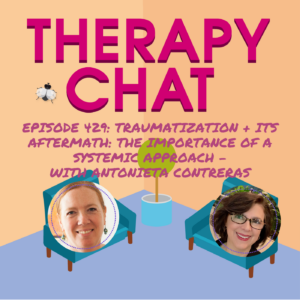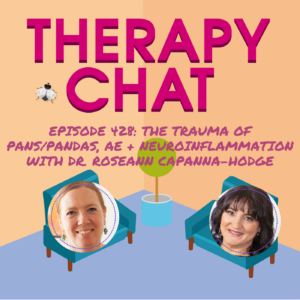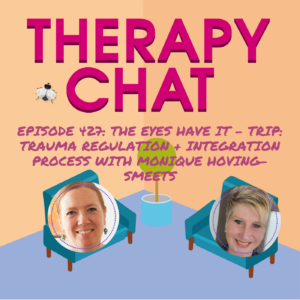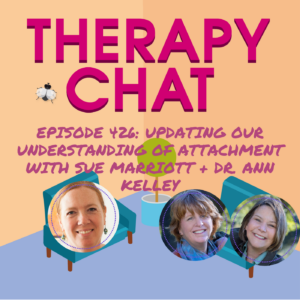Thank you to this episode’s sponsor, TherapyNotes. Get a 2-month free trial of TherapyNotes by going to www.TherapyNotes.com and using the promo code TherapyChat.
Episode 232: Confronting Structural Inequality & White Supremacy
I. I am a white person, and I have my own internalized biases, including racism. I am continually working to confront my own biases and to do better, and I do my best to challenge racism when I see it. I am not an expert in anti-racism work but as a social worker and activist, I do have a lot of education and experience in social justice work. I cannot and won’t pretend to have the lived experience of a Black or Brown person living in America and I will give a long list of resources at the end of this episode, that is not an exhaustive list by any means. As I posted on social media earlier in the week, we have two Americas. One that works for white people and one that works against Black people. After the recent deaths of George Floyd, Breonna Taylor and Ahmaud Arbery, protests have taken place in cities all over the US and around the world. There are many people who are speaking out against racism and doing boots-on-the-ground work in this area, and I will provide many resources to help you learn more about what they are doing. Since I have a platform that reaches a number of people, I want to take the opportunity to address those who listen to this podcast in hopes that if you feel lost on how to make a difference on the issue of racism, you might have more clarity after listening to today’s show.
II. Why am I talking about this? I am a social worker. We follow the National Association of Social Workers (NASW) Code of Ethics. One of the primary ethical principles that we follow states “Social workers challenge social injustice.”
Read below:
Ethical Principle: Social workers challenge social injustice.
Social workers pursue social change, particularly with and on behalf of vulnerable and oppressed individuals and groups of people. Social workers’ social change efforts are focused primarily on issues of poverty, unemployment, discrimination, and other forms of social injustice. These activities seek to promote sensitivity to and knowledge about oppression and cultural and ethnic diversity. Social workers strive to ensure access to needed information, services, and resources; equality of opportunity; and meaningful participation in decision making for all people.
In addition, part of being a trauma-informed therapist is understanding the power differential inherent in therapy. And my clients have experienced the trauma of abuse, which is rooted in patriarchal beliefs – for example, that children must obey their parents and that beating them will make them obey. Most of my clients have experienced sexual violence in some form, which is again rooted in patriarchy. So even when I am not directly talking about racism, awareness of the impact of systemic inequality which supports white supremacy is inherent in the work I do every day. If I fail to understand that I am part of the problem. As I have already acknowledged, my white privilege is a part of me that I was born with, just as being oppressed is something that every black person born in America is born with. It is not fair that I have privilege any more than it is fair that a black person is born with a disadvantage that our country assigns to them based on the color of their skin. That is why I am talking about this today.
III. this brings us to what happened to Christian Cooper in Central Park last week. And what could have happened had he not filmed his encounter with Amy Cooper, to whom he is not related. In case you somehow missed that story, Mr. Cooper was birdwatching in Central Park in New York City when he came upon Amy Cooper, who had her dog off-leash in an area where dogs are required to be leashed. Mr. Cooper politely asked Amy Cooper to put her dog on a leash and she argued basically that she didn’t have to, so he started recording her. She then said that she was going to “call the police and tell them that an African American man is threatening my life”. Which he wasn’t. She called 911 while being video recorded and on her end of the call it sounded as if someone was attacking her, as her voice rose and became more panicked and hysterical sounding. Maybe she did that on purpose, as some have said, or maybe she really was scared. Mr. Cooper was simply existing, birdwatching, and asked her to follow the park’s rules and leash her dog. After the video was viewed millions of time and she lost her dog and her job, she apologized, stating, according to CNN, “I’m not a racist. I did not mean to harm that man in any way.”
In the same week that this happened in Central Park, protests took place over the deaths of George Floyd in Minneapolis, Breonna Taylor in Louisville, and Ahmaud Arbery in Georgia. As you should know, George Floyd and Breonna Taylor were killed by police, and Ahmaud Arbery was killed by two white vigilantes while jogging. The Baltimore Sun published an op-ed calling these events lynchings.
Their names are added to a long list of others who have been killed because of the color of their skin. Including, in recent years: Philando Castile. Eric Harris. Corey Jones. Walter Scott. Yvonne Smallwood. Freddie Gray. Tamir Rice. Sandra Bland. Trayvon Martin. Tony McDade. Eric Garner. Randolph Evans. Alton Sterling. Michael Brown. Sean Reed. John Crawford, III.
Now this is what I want to talk about. To all of us white people who do not want to think of ourselves as racists. What I am about to share may bring up some cognitive dissonance for you. For anyone who doesn’t know, this is when your identity, the way you want to see yourself, clashes with information that makes you think about yourself in a different way. It is uncomfortable, and I challenge you to be brave enough to sit with your discomfort and don’t turn away.
This list comes from a graphic I found on social media. I don’t know its origin but I found it through @theconsciouskid.
There is the overt type of racism that most of us consider to be loathsome. This includes: Lynching, hate crimes, blackface, swastikas, racist jokes, racist slurs, burning crosses, the N word, Neo-Nazis, KKK for example. I think most of us know those behaviors and hate groups are racist. Then there is covert racism, which is more insidious because it is embedded in our society. Examples include: calling the police on black people, white silence, colorblindness, white parents self-segregating neighborhoods & schools, white savior complex, eurocentric school curriculums, education funding from property taxes, tone policing, racist mascots, not believing experiences of BlPOC, paternalism/patriarchy, victim-blaming, “don’t blame me, I never owned slaves,” higher infant & maternal mortality rates for BlPOC, discriminatory lending, spiritual bypassing, racial profiling, “All Lives Matter,” bootstrap theory, denial of racism, claiming reverse racism, expecting black people to teach white people about racism, housing discrimination, attributing more maturity and responsibility to black children than you would to white children, housing and employment discrimination…the list goes on and on.
As a white person, whether or not you identify as racist, you benefit from the structures that support white supremacy. For example, property inheritance. Many white people have had the opportunity for property to be passed down for generations, giving white people a better start than most black people have had available, particularly because for many years black people were not allowed to own property. So white people have, in general, had hundreds of years of head start on accumulation of wealth that was not available to black people. That is just one simple example. This country was built on white supremacy – just consider the Declaration of Independence, written by a group of wealthy white men who were “owned” enslaved people. Like Thomas Jefferson, who had several children by an enslaved girl, Sally Hemings, beginning when she was only 14 years old. Those children, who were also enslaved, had no inheritance rights despite being biological children of this powerful landowner. The Declaration of Independence states : “We hold these truths to be self-evident, that all men are created equal, that they are endowed by their Creator with certain unalienable Rights, that among these are Life, Liberty and the Pursuit of Happiness.” Clearly they did not see blacks as “men,” since they had no right to life or liberty and the rights in the Constitution did not apply to them (or to women either, there’s that patriarchy again).
So – back to the present day – Amy Cooper, in Central Park, just did what any white woman might do if she was alone and did not have a white man to give her power. Since women are disempowered in the US, we get our power from our association with men. At least, white women do. We are born and raised to understand that first our fathers will protect us, and then when we are adults our husbands will protect us. And if our fathers and our husbands aren’t around, then we can call the police who will come and protect us. Why do we women need so much protection? Because our culture with its hypermasculinity says that we are sexual objects for men to compete for, and it is not until we are married that we are safely off limits to men other than our husbands. This is one of the ways that women unconsciously perpetuate white supremacy and the patriarchy. We have seen this happening so often on video now, thanks to social media, which is shining a light on how things really are for those who are living outside of our bubbles. There is even a meme that describes how Karens – white women who are indignant when they feel black people are stepping out of line – demand to speak to the manager or call 911 when they see black people picnicking in a park or drinking water in Starbucks.
IV. so what we are talking about here is structural racism. I found a great definition of structural racism on the Racial Equity Tools website, where they quoted an organization called Solid Ground, which is based in Seattle. It says ” “the systematic distribution of resources, power and opportunity in our society to the benefit of people who are white and the exclusion of people of color. Present-day racism was built on a long history of racially distributed resources and ideas that shape our view of ourselves and others. It is a hierarchical system that comes with a broad range of policies and institutions that keep it in place. In the United States, institutional racism has been responsible for slavery, settlement, Indian reservations, segregation, residential schools (for American Indians), and internment camps. While most of these institutions no longer exist, they have had long-term impacts on our society. As a result of institutional racism, racial stratification and disparities have occurred in employment, housing, education, healthcare, government and other sectors. While many laws were passed in the mid-20th century to make discrimination illegal, major inequalities still exist.” So if you think having our first black President resolved all the problems of our country’s racism, think again. STOP
If you are a white person, ask yourself whether you would choose to be black if you could. Black people are beautiful, wonderful, gifted contributors to American society. We love black culture but our society does not love black people. If you are being honest with yourself, I don’t think anyone would choose to be black in America, because we all know that black people in this country are not treated fairly. I respect the role of law enforcement, but I would not be afraid to look a police officer in the eye and explain why I was speeding or to argue if I was accused of running a red light that I know wasn’t red. I don’t have to worry about being killed when I get pulled over. Even though that could happen, it is so unlikely that it doesn’t cross my mind. And if I were killed after being pulled over for speeding, there would be outrage in the community because people would think it was wrong that I, a white woman, was killed in a traffic stop. That is why the Black Lives Matter movement exists. Because when a black person is killed during a traffic stop, white people tend to say, “well, you don’t know what happened before the video started.” or “he should have followed the police officer’s orders.” “He was resisting.” “he tried to run away.” We don’t ask why a gun was pulled on someone who was pulled over for a broken taillight or running a red light. There needs to be a movement called “Black Lives Matter,” because to white Americans, when a black person is murdered there is little reaction.
Philando Castile was in lawful possession of a gun, which he disclosed to the officer, and he was killed anyway. I feel that the Second Amendment rights that are so important to many Americans are only valid for white people, one of the many ways that our laws are enforced unequally. Why do white people need so much protection? We have the most power yet we are still so afraid. Maybe we are so afraid because we know that we as a country are mistreating an entire group of people and have been for the entirety of the colonization of this land that we took from the indigenous peoples who lived here prior to the 1600s. If we had an egalitarian society where everyone enjoyed the great American dream, maybe we would have less to fear from our fellow citizens. If you don’t understand what I’m talking about, please start out by reading Howard Zinn’s book, A People’s History of the United States, which tells our country’s origin story from the point of view of the indigenous peoples who experienced genocide in the name of colonialism.
I saw a great satirical article that talked about how the current situation in the US could be written about if it was happening in another country. I will read a couple of quotes from that article.
” In recent years, the international community has sounded the alarm on the deteriorating political and human rights situation in the United States under the regime of Donald Trump. Now, as the country marks 100,000 deaths from the coronavirus pandemic, the former British colony finds itself in a downward spiral of ethnic violence. The fatigue and paralysis of the international community are evident in its silence, America experts say.
The country has been rocked by several viral videos depicting extrajudicial executions of black ethnic minorities by state security forces. Uprisings erupted in the northern city of Minneapolis after a video circulated online of the killing of a black man, George Floyd, after being attacked by a security force agent
“Sure, we get it that black people are angry about decades of abuse and impunity,” said G. Scott Fitz, a Minnesotan and member of the white ethnic majority. “But going after a Target crosses the line. Can’t they find a more peaceful way, like kneeling in silence?”
Ethnic violence has plagued the country for generations, and decades ago it captured the attention of the world, but recently the news coverage and concern are waning as there seems to be no end in sight to the oppression.”
V. So what can you and I do about these issues?
Concrete things. Confront your own internalized racism. This will bring up the shame of privilege. Don’t get swallowed up by shame, and take a break if you need to take a break (a privilege that black people don’t get) and then get back to it as soon as you can. Don’t ask black people to expend their emotional labor for free to teach you and absolve you of responsibility. Pay black people who are teaching about anti-racism work and learn from them.
How to do that? I am going to give you a bunch of resources, by no means an exhaustive list, of people you can learn from. After this I am going to step back because I am not the expert here. But I hope that by using my voice to educate white members of my audience on racism, I may make a difference in some way.
Resources:
Leave me a message via Speakpipe by going to https://therapychatpodcast.com and clicking on the green Speakpipe button.
Thank you for listening to Therapy Chat! Please be sure to go to iTunes and leave a rating and review, subscribe and download episodes. You can also download the Therapy Chat app on iTunes by clicking here.
Podcast produced by Pete Bailey – https://petebailey.net/audio




